The KVVAK trip to China - Travel Diary by Alice Rijkels
It is Wilma’s birthday today, a special day for me, my sister in law’s birthday, she will be celebrating with her husband, Pieter congratulates her, me too…in my heart, as am going today with the group to Jingdezhen.
Our luggage is waiting to get loaded into the bus, travelers and business people fill the reception hall. Plenty of our group I encounter in the breakfast room, good to find Bente here! The breakfast buffet is very good, a lot of vegetables, fruit and a noodle soup with hot pepper, tastes good. We drive to the airport Xiamen, the group is looking forward to the next days, but I’ll miss Fuzhou, I would have liked to stay around, disappear in the museum and the crowds, go to the temple, speak to the people, dance, swim and look for birds, set up businesses, speak the famous Min dialect, go into the mountains, chase the mosquitoes of my skin with that sticky terrible oil. Away from the western world, live and work here, if only I could. Today I fulfil this western view of an independent woman with a target, a drive, but is it true? Fuzhou is a place, of which the name never crossed my mind, its inhabitants were somewhere beyond the horizon of my unconscious mind. Now it is so close to my heart.
At Xiamen we embrace the driver, and Sou walks up to us to assist us with checking in – a big surprise…the guide from Quanzhou is back for a short instance! At Xiamen airport the group splits up again in the shopping area after the check in is done; my luggage has gone up to 27 kg due to the acquisition of books. Our group is an Airport tribe: they have an internal compass where the lobby is and where the plane leaves. A nice soup is served in a restaurant, I take one too,
Sunday October 23, 2016
October 23, 2016
|
Fuzhou
It is Wilma’s birthday today, a special day for me, my sister in law’s birthday, she will be celebrating with her husband, Pieter congratulates her, me too…in my heart, as am going today with the group to Jingdezhen.
Our luggage is waiting to get loaded into the bus, travelers and business people fill the reception hall. Plenty of our group I encounter in the breakfast room, good to find Bente here! The breakfast buffet is very good, a lot of vegetables, fruit and a noodle soup with hot pepper, tastes good. We drive to the airport Xiamen, the group is looking forward to the next days, but I’ll miss Fuzhou, I would have liked to stay around, disappear in the museum and the crowds, go to the temple, speak to the people, dance, swim and look for birds, set up businesses, speak the famous Min dialect, go into the mountains, chase the mosquitoes of my skin with that sticky terrible oil. Away from the western world, live and work here, if only I could. Today I fulfil this western view of an independent woman with a target, a drive, but is it true? Fuzhou is a place, of which the name never crossed my mind, its inhabitants were somewhere beyond the horizon of my unconscious mind. Now it is so close to my heart.
At Xiamen we embrace the driver, and Sou walks up to us to assist us with checking in – a big surprise…the guide from Quanzhou is back for a short instance! At Xiamen airport the group splits up again in the shopping area after the check in is done; my luggage has gone up to 27 kg due to the acquisition of books. Our group is an Airport tribe: they have an internal compass where the lobby is and where the plane leaves. A nice soup is served in a restaurant, I take one too,
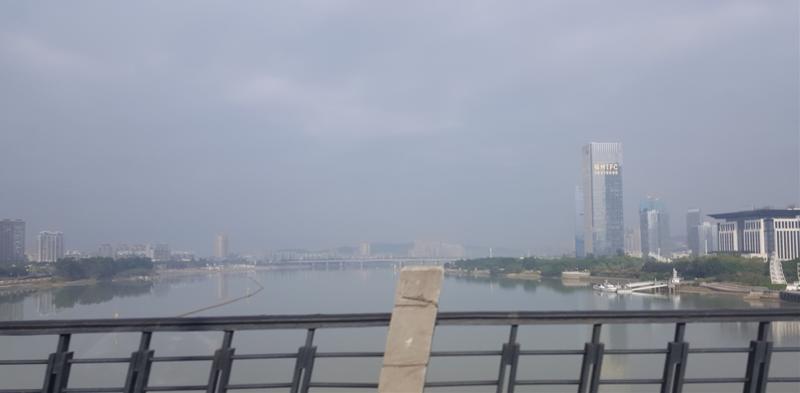
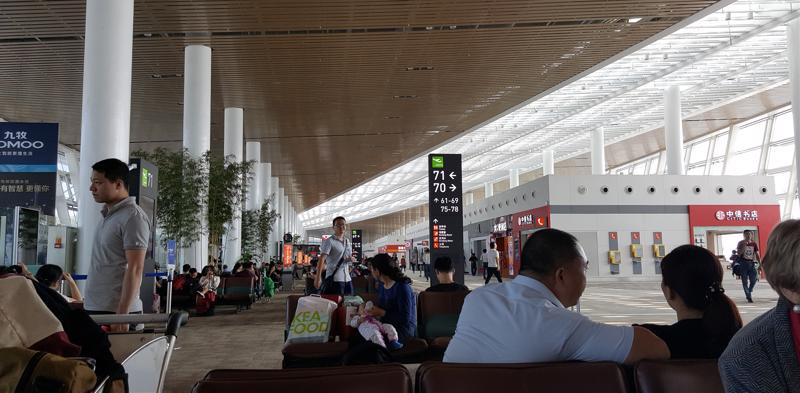
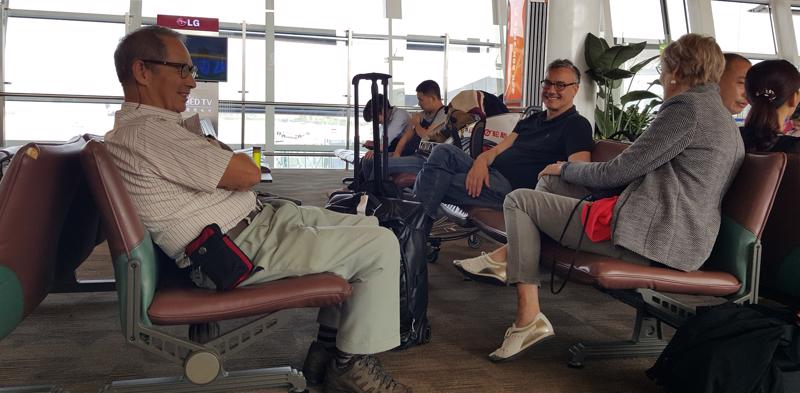
some Chinese look interested, another selfie. Bente walks into the restaurant, we chat and share our happiness. Before the plane leaves we wait before the gate with Ting-tiang, Carl and Bente in these typical plastic blue chairs. I shoot great pictures, everyone looks radiant, feels happy and relaxed. Sam comes over to talk with us about porcelain, he looks happy too, making fun and leading porcelain discussions. Bente is very elegant in her tweed suit, all in the right colors and tones with a bright pink scarf and golden round dangling earrings, Ting-tiang sits calm and composed with a big smile, he is a great chaperone, Carl sits broad shouldered with bright twinkling eyes, dressed bohemian, asking critical questions, showing his candor by being a kick-ass boss in Arts without having lost his sense of humanity, while I fail at all questions asked on culture. Truke, Wai Lan and Christine are somewhere in the hall. A Chinese baby does an afternoon nap on a Mother’s lap, her head against an IKEA bag.
The plane brings us to Jingdezhen, skies are overcast here and grey, on our way in the bus to the hotel empty looking building project development sites are visible. Sam and Marion have split themselves of the group to meet a special circle of friends from a porcelain group, a group in which I will never land in with my poor knowledge on refined porcelain and art, I long to get back home to read Nigel Wood, to own porcelain may not be my destiny, to love porcelain sure is, which is a big luxury. I read a copy of a Wiki text on Jingdezhen:
----------------------------------------------------------------------------------
Notes on Jingdezhen:
During the Han Dynasty, Jingdezhen was known as Xinping. Historical records show that it was during this time that it began to make porcelain. Xinping then was renamed Changnanzhen (Changnan Town) during the Tang Dynasty, as the site sits at the south bank of the Chang river. In 1004 CE during the North Song Dynasty, it was renamed again as Jingdezhen, taking the era name of the emperor during whose reign its porcelain production first rose to fame.
In the Ming and Qing dynasties, Jingdezhen was considered one of China's four great towns in terms of commercial and industrial importance. The others were Foshan in Guangdong, Hankou in Hubei, and Zhuxian in Henan.
In the 19th century, Jingdezhen became a county. During the period of the People's Republic of China it became a provincial city but retained the Jingdezhen name. Usually when a town is upgraded to a city, the designation of "city" replaces that of "town", but Jingdezhen retained its name to honor its history.
Jingdezhen was named one of top 24 national historical and cultural cities of the People's Republic of China on February 28, 1982.
In 2004, Jingdezhen celebrated the millennium of its becoming the porcelain capital and its assuming its present name.
----------------------------------------------------------------------------------
The Jingdezhen New Century Manju hotel is located in a small commercial porcelain area. The dreamy looking ladies at the reception of the hotel seem to swim in a pond of happiness, a little unconscious in a lovely way. A chimney pipe from the kiln is visible from my hotel room. In the room I make tea in the small globular pot I bought near Dehua. The taste of the tea is the best I have tasted so far. When I go out of my room a tall American man walks through the hotel corridors with a big professional looking camera. I ask him in the elevator what he is doing here: he tells me he has just finished working and is now going to take pictures, he is called Michael. Carl is somewhere in the corridor going somewhere too, he offers to teach me how to stand on my head. As I go to knock on his door 5 minutes later, I take the wrong route again, wondering around the long corridors, I find my own room again. Finally I find his room somewhere just round the corner, he strides into the corridor, we pick a wall and his feet go up in the skies before I know it. Apparently it is what all the smart yoga people are able to do, Carl has the DNA and yoga experience to do this. He complains about my: lack of good posture, cramped movements and lack of elegance, however...for this yoga lesson he tells me I should not mind how I look. So I get my feet up in the air, all you need to do is relax your joints and get your feet up, he keeps telling me. As dusk is falling we stop our yoga and hurry, as later on we will check out with the group the area around the hotel. When we go outside It rains buckets. We step outside and pace through the small alleys, there are modern buildings here in red stone with friendly small shops, many of which sell porcelain. A restaurant we do not find easily outside the hotel. So to the hotel we return where the waiter directs us to sit at a big rectangle dinner table. Carl points out I am to sit straight up like I would be wearing a big broach on my chest, Bente does this by nature, while Wai Lan does because she is well educated, Truke does because it is a thing to do without a second thought, Christine does because she did this even before she got born, Ting-tiang does because he sets an example how to be tough. We miss the two guys from our group, Sam and Marion, they have left us alone to go out with the real porcelain people, yes we miss Sam and Marion. It reminds me too
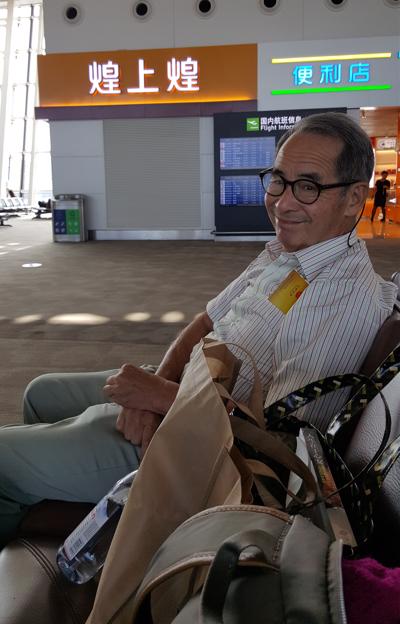
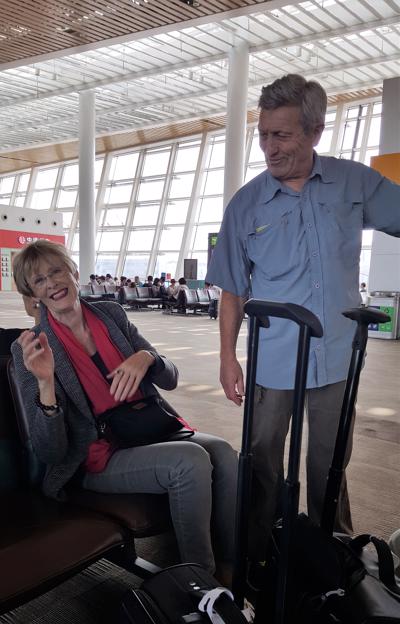
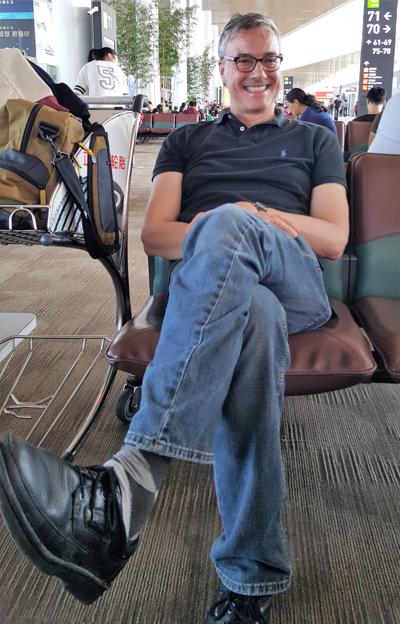
that the week will be over in a few days and I’ll be eating on my own. The dinner is great, the waiter is very kind, after dinner we forget critical matters on the table there – the waiter runs after us, bends politely and gives me my smart phone, glasses for someone else of the group appear to have been left as well, on top of this he reappears with the tip we left for him on the table – did we forget that too? In my room I install myself, I phone Pieter, who gets a little lonely, great to hear Pieter’s voice also Leila is purring through the phone, we congratulate each other with Wilma’s birthday, a great sister-in-law. Time for a shower and a tea, and time for writing my notes. I hear a loud voice singing, it comes from the alley below in the streets, it copies my singing. Hymn for the weekend Coldplay sings, I think about Jingdezhen’s history and when a European first described it: here François Xavier d'Entrecolles (1664 AD Lyon – 1741 AD) was in 1722 during the Kangxi reign, he wrote a lot of letters. Describing the porcelain industry: the black smoke hanging above the dark alleys. Both D.F. Scheurleer and Jan-Erik Nilsson made a great translation of his text.
Françoise Xavier d’Entrecolles, was born in Lyon France, 1664. He entered the company of Jesus in 1682 and went to China in 1698. At first he was missionary to Yangxi, where he was quickly appreciated by all for his profound knowledge of the Chinese language, his friendly personality, his understanding of Chinese customs and his apostolic spirit. He wrote letters with description ao of life in China, which have become very famous.
The first letter from Pere d’Entrecolles was sent on September 1, 1712 from [Jao zhou] Raozhou in Jiangxi province, to Father Orry of the Company of Jesus. The second letter was sent January 25, 1722 from the city of Jingdezhen. Father d'Entrecolles entire career and stay in China was within the reign period of the Kangxi emperor (1662-1722).
The letters of Père Francois Xavier d'Entrecolles provide a first-hand account of the manufacture of porcelain at Jingdezhen (The city of thunder and lightning) during the first quarter of the eighteenth century. Père d'Entrecolles was a French Jesuit missionary and lived from 1664 to 1741. Two of his letters, the first written in 1712 and the second in 1722 are the first and most important early accounts on Chinese porcelain, which arrived in the West.
The two letters were translated from the French and published in William Burton's Porcelain, It's Art and Manufacture, B.T. Batsford, London, 1906. The text here originally came from this version, but while being double-checked towards the version of the same text occurring in Brieven van pater d'Entrecolles (Yin Hongxu) by D. F. Lunsing Scheurleer, Caneletto, Alphen aan den Rijn, 1982, it became obvious that the errors and omissions were so grave as to render the text useless. For the current version the original French text as reproduced by Scheurleer (1982) has been used together with the English version translated by Robert Tichane (1983). The current version that appears here are transcribed by Cheryl Marie Cordeiro and Jan-Erik Nilsson.
It is here like in Edmund de Waal’s book on white porcelain “The white road”, but then at the start of the 18th century. It is raining and then suddenly very hot. Jan-Erik Nilsson is an author and specialist of / professor in porcelain in Goteborg: he made the perfect travel diary already, so why should I bother? Lying on my bed am incredulous to people’s faith, how is it that I got this lucky – in one
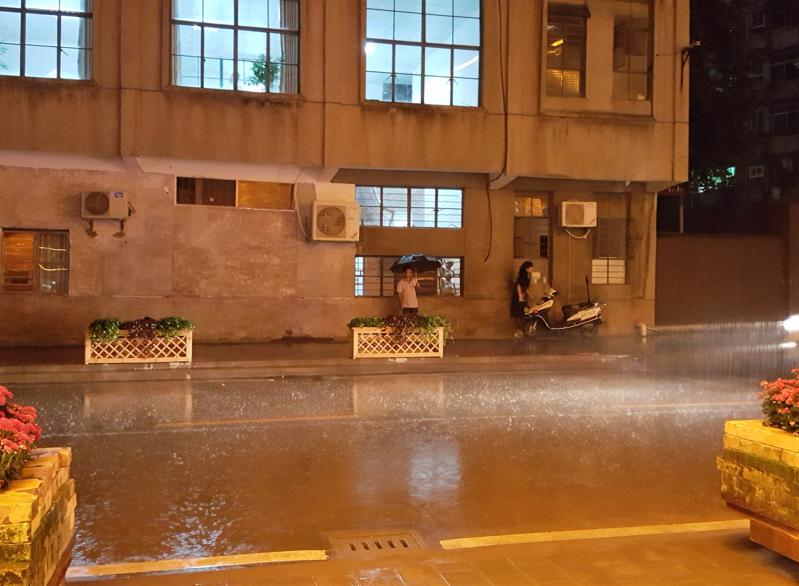
and the same life?
1.
Introduction
2.
Saturday October 15, 2016
3.
Sunday October 16, 2016
4.
Monday October 17, 2016
5.
Tuesday October 18, 2016
6.
Wednesday October 19, 2016
7.
Thursday October 20, 2016
8.
Friday October 21, 2016
9.
Saturday October 22, 2016
10.
Sunday October 23, 2016
11.
Monday October 24, 2016
12.
Tuesday October 25, 2016
13.
Wednesday October 26, 2016
14.
Thursday October 27, 2016
15.
Friday October 28, 2016
16.
Saturday October 29, 2016
17.
Sunday October 30, 2016
Share your travel adventures like this!
Create your own travel blog in one step
Share with friends and family to follow your journey
Easy set up, no technical knowledge needed and unlimited storage!